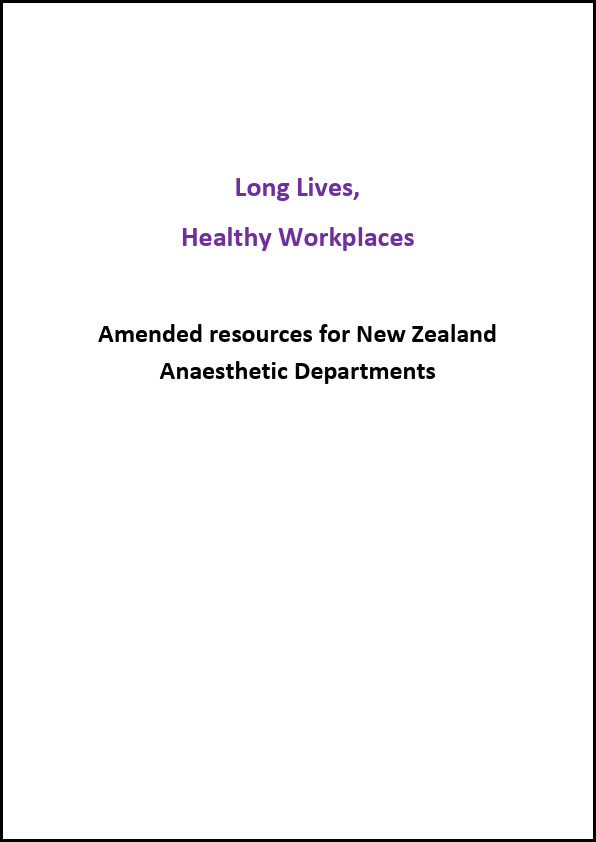
How CPD can support your health and wellbeing Professional, Leader & Manager, Health Advocate
Guide index
 Library > Library guides > Professional development hub > CPD for clinical support roles
Library > Library guides > Professional development hub > CPD for clinical support roles
Key areas to consider in planning your CPD include:
Practice evaluation (category 1)
Own wellbeing
Your support for the wellbeing of others
Knowledge & skills (category 2)
 The college welcomes suggestions on additional resources and topics for CPD on health and wellbeing.
The college welcomes suggestions on additional resources and topics for CPD on health and wellbeing.



 Long Lives, Healthy Workplaces: A Toolkit for Anaesthetic Departments
by
Long Lives, Healthy Workplaces is an initiative of the Wellbeing Special Interest Group and Everymind, with support from the Australian Society of Anaesthetists (ASA) and additional funding leveraged under The Prevention Hub. The purpose is to provide a freely-accessible toolkit to support better mental health and wellbeing for anaesthetists and anaesthetic trainees.
Long Lives, Healthy Workplaces: A Toolkit for Anaesthetic Departments
by
Long Lives, Healthy Workplaces is an initiative of the Wellbeing Special Interest Group and Everymind, with support from the Australian Society of Anaesthetists (ASA) and additional funding leveraged under The Prevention Hub. The purpose is to provide a freely-accessible toolkit to support better mental health and wellbeing for anaesthetists and anaesthetic trainees.
 Long Lives, Healthy Workplaces: Amended resources for New Zealand Anaesthetic Departments
by
Long Lives Healthy Workplaces is a freely-accessible toolkit for Anaesthesia Departments which includes resources to support wellbeing. The toolkit has been tailored for NZ anaesthetists and is an initiative of the Wellbeing Special Interest Group and EveryMind, an Australian institute dedicated to mental wellness. We encourage you to access this resource for yourself and/or your department.
Long Lives, Healthy Workplaces: Amended resources for New Zealand Anaesthetic Departments
by
Long Lives Healthy Workplaces is a freely-accessible toolkit for Anaesthesia Departments which includes resources to support wellbeing. The toolkit has been tailored for NZ anaesthetists and is an initiative of the Wellbeing Special Interest Group and EveryMind, an Australian institute dedicated to mental wellness. We encourage you to access this resource for yourself and/or your department.






 Good Medical Practice: A Code of Conduct for Doctors in Australia
by
Good medical practice (the code) describes what is expected of all doctors registered to practise medicine in Australia. It sets out the principles that characterise good medical practice and makes explicit the standards of ethical and professional conduct expected of doctors by their professional peers and the community.
Good Medical Practice: A Code of Conduct for Doctors in Australia
by
Good medical practice (the code) describes what is expected of all doctors registered to practise medicine in Australia. It sets out the principles that characterise good medical practice and makes explicit the standards of ethical and professional conduct expected of doctors by their professional peers and the community.
 Good Medical Practice [New Zealand]
by
A doctor's first concern is to take care of their patient, and to do so with respect, honesty and professionalism.
Our "Good Medical Practice" publication sets out the principles and values that define good medical practice, and provides guidance to doctors on the standards we expect of them in all aspects of their professional behaviour.
Good Medical Practice [New Zealand]
by
A doctor's first concern is to take care of their patient, and to do so with respect, honesty and professionalism.
Our "Good Medical Practice" publication sets out the principles and values that define good medical practice, and provides guidance to doctors on the standards we expect of them in all aspects of their professional behaviour.
Screening tools


Quick links
About ANZCA
Copyright © Australian and New Zealand College of Anaesthetists.